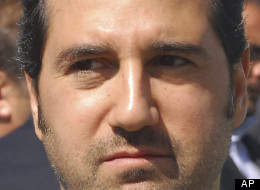 When protesters took to the streets against the Assad family 16 months ago to launch what has become a nationwide uprising, one of their first chants was “Makhlouf is a thief.”
When protesters took to the streets against the Assad family 16 months ago to launch what has become a nationwide uprising, one of their first chants was “Makhlouf is a thief.”
They were referring to Rami Makhlouf, Bashar al-Assad’s maternal cousin, who has run a vast business empire – from telecoms to banks, to real estate, to taxis – since Assad took the reins of power from his father in 2000.
With the death of Assad’s brother-in-law Assef Shawkat in a bomb attack on Wednesday, international attention has focused on the inner circle of Assad clan, where few men are more influential – or hated – than the billionaire cousin Makhlouf.
Makhlouf, who could not be contacted to comment, says he is legitimate businessman whose dealings are all above board.
The extensive reach of his business network into nearly all sectors of the economy has alienated much of the merchant community in the country and become one of the main sources of anger fuelling the revolt.
During the first protests in the town of Deraa, enraged residents set the police station on fire and burned the Deraa branch of Syriatel, Makhlouf’s mobile phone provider.
In an apparent concession to public anger at his high profile, the 43-year-old said last June that he was quitting the Syrian business scene and becoming a philanthropist. He has since shunned the spotlight.
Nevertheless, emails released by WikiLeaks between high-level employees of Cham Capital, Syria’s largest holding company and part of the Makhlouf empire, appear to show that he was still buying shares in two private Syrian banks after his announcement. The e-mails cannot be independently verified.
The tycoon has been under U.S. sanctions since 2008 for what Washington calls public corruption. European Union foreign ministers slapped further sanctions on him in May 2011, accusing him of bankrolling Assad.
Assad’s father Hafez raised the Makhlouf family to the upper crust when he married Anisa Makhlouf, Rami’s aunt. The late president made Rami’s father his financial advisor, establishing an empire in telecoms, banking, retail and oil and gas.
For all Rami’s power, big oil deals are still said to go through his father. But Rami and Bashar have largely taken on the roles of their fathers.
“Rami is the caretaker of the family’s investments and is widely considered to be the poster boy of corruption in Syria,” said a classified 2006 cable to Washington from the U.S. Embassy in Damascus, released by WikiLeaks.
“Many business contacts have relayed to (the Embassy) how Makhlouf has used the Syrian security services and his personal relationship to President Assad to intimidate and steal promising business ventures from them,” it added.
RESENTMENT
Enemies call him “Mr 10 percent” for making sure he gets his cut of deals, and complain that rules are written to favour him.
“Makhlouf writes the laws,” said one Damascus trader. “Whether it is tax or trade law. The regulatory climate is tailored to his preference,” he said, without elaborating.
David Lesch, a professor of Middle East History at Trinity University in Texas who met Makhlouf at Syriatel headquarters and joined him for lunch in May 2010, said Makhlouf often repeated that he was a businessman and not a political actor.
“He said he had no political clout and every time he talked about politics he would say: ‘These are my own private thoughts,’” Lesch said.
Lesch, who also knows Assad personally, says Makhlouf runs a tighter ship when it comes to business and is less generous than his father, which has “bred a great deal of resentment.”
Huffington post

Leave a Reply
You must be logged in to post a comment.